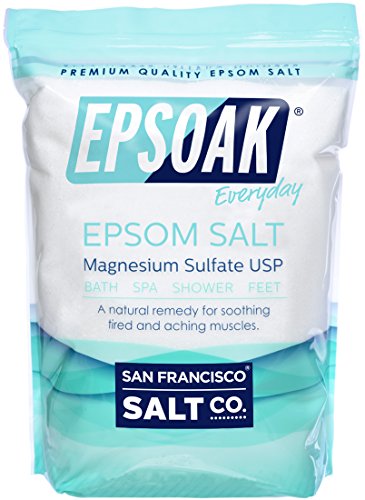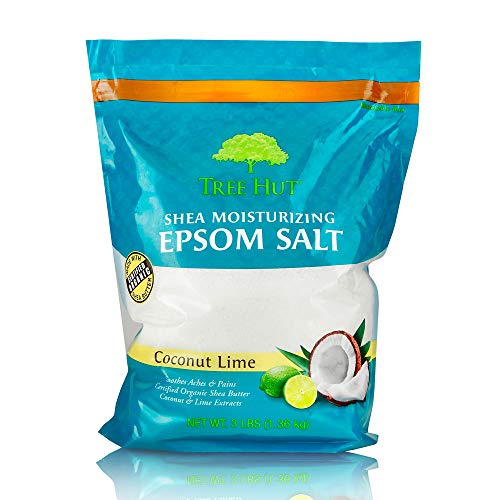Epsom salt is a potent mineral compound comprised of magnesium and sulfate. It is widely used to relieve many minor health issues. Soaking in a bath with Epsom salt can relieve achy feet and soothe sore muscles. Epsom salt is used in skin cleansers and hair care products to help naturally exfoliate skin and give hair more volume and shine. Many people also turn to Epsom salt as a remedy for occasional constipation as ingesting food grade Epsom salt flushes the gastrointestinal tract and encourages detoxification.
What Is Epsom Salt?
Epsom salt is named after the English town of Epsom, where the substance was first produced. Although it is referred to as “salt,” it does not contain sodium and, despite sharing similar physical characteristics, has different properties from table salt. For instance, adding Epsom salt to warm bath water makes your skin feel smooth and silky, while table salt has a drying effect. For this reason, Epsom salt is a common ingredient in bath salts that cleanse and soften skin.
“All products labeled as Epsom salt are essentially the same, but there is a difference between “food grade” Epsom salt and non-food grade Epsom salt – the latter being produced for agricultural use.”
All products labeled as Epsom salt are essentially the same, but there is a difference between “food grade” Epsom salt and non-food grade Epsom salt – the latter being produced for agricultural use. The former will bear the “USP” designation, which means it is certified according to standards set by the United States Pharmacopeia and the Food and Drug Administration. Because agricultural or garden grade Epsom salt is not manufactured under the same conditions, it may contain contaminants.
 Epsoak Epsom Salt - 5 ...
Buy New $12.99 ($0.16 / Ounce)
(as of 01:05 UTC - Details)
Epsoak Epsom Salt - 5 ...
Buy New $12.99 ($0.16 / Ounce)
(as of 01:05 UTC - Details)
What Makes Epsom Salt Work?
Epsom salt has two major components: magnesium and sulfate (sulfur). These minerals are essential for optimal health. Magnesium is a cofactor involved in more than 300 enzymatic processes, including protein and DNA synthesis, the regulation of blood pressure and serum glucose levels, and supporting the body’s detoxification routes. Magnesium is also required for the uptake of calcium and potassium, both of which are necessary to regulate nerve, muscle, and heart function.[1]
Sulfate is involved in several biological functions as well, most notably in the gut. This mineral facilitates the release of protease, lipase, and amylase, which are pancreatic enzymes needed to digest food. It is needed to form specialized proteins in epithelial cells. These cells line and lubricate your intestinal tract to keep things moving smoothly and prevent intestinal bacteria from leaking into the bloodstream. Sulfate is also required for the prenatal development of brain tissue.[2] Dietary sources of magnesium include whole grains, green leafy vegetables, nuts, and seeds.
10 Epsom Salt Benefits
- Soothes inflammation
- Relieves discomfort caused by sunburn
- Relieves itchiness caused by poison ivy
- Helps reduce stress
- Fixes magnesium deficiency
- Supports recovery after exercise
- Relieves occasional constipation
- Promotes radiant skin and hair
- Relaxes tired, aching feet
- Fertilizes your garden
Due to the beneficial qualities associated with magnesium and sulfate, Epsom salt is used as a natural remedy to support many health issues including inflammation, constipation, and strain from exercise. It may also help remove splinters, relieve a sunburn, and soothe the itch from poison ivy.
Bathing with Epsom salts is a healthy way to reduce stress, while at the same time promoting the elimination of environmental toxins from your body and increasing new cell turnover through exfoliation. It is also used in beauty regimes and can even be added to soil for a healthier garden.
Soothes Inflammation
Inflammation is a natural process in which white blood cells rush to the site of injury to counter foreign agents that might lead to infection. Evidence of this taking place is seen in localized swelling, bruising, itching, or redness. Adding two cups of Epsom salt to a warm bath breaks down this compound into its two components, magnesium and sulfate. Since these minerals are readily absorbed through the skin, soaking in this solution may reduce discomfort and swelling from sore muscles and joints, aching feet, sprains, bruises, and minor skin irritations.
While chronic inflammation may not immediately affect your health, it can be quite damaging over time. One of the markers used to evaluate ongoing inflammation is the level of serum C-reactive protein (CRP). High levels are linked to an increased risk of cardiovascular disease, irritable bowel disease, rheumatoid arthritis, and other inflammatory conditions. Research shows that magnesium plays a significant role in inhibiting chronic inflammation and that insufficient intake of this mineral leads to elevated CRP levels.[3, 4]
 Tree Hut Shea Moisturi...
Buy New $7.05 ($0.15 / Ounce)
(as of 12:55 UTC - Details)
Tree Hut Shea Moisturi...
Buy New $7.05 ($0.15 / Ounce)
(as of 12:55 UTC - Details)
Fixes Magnesium Deficiency
Epsom salt can help fix magnesium deficiency. Magnesium deficiency can result from not getting enough magnesium in your diet. Additionally, the National Institutes of Health, warns that magnesium deficiency commonly happens as a result of medical conditions like kidney disease, diabetes, and Crohn’s disease. People who use certain medications that interfere with the absorption of this mineral, or that speed its elimination from the body can also be deficient. Other factors that can lead to low magnesium include excessive intake of alcohol or caffeine, consuming too much salt, heavy menstrual periods, and chronic stress.[9]
Symptoms of magnesium deficiency include, but are not limited to:
- Unhappy mood
- Mental fog or confusion
- Irritability
- Muscle twitching or weakness
- Insomnia
- Nail disorders
- Restless leg syndrome
- Seizures
Supports Recovery After Exercise
Soaking in an Epsom salt bath after intense exercise can help relieve muscle pain. Studies show that supplementing with magnesium sulfate before working out may enhance performance and stamina. An Epsom salt supplement before a round of calisthenics could help reduce lactic acid buildup in muscles during intense exercise, minimizing the risk of injury, cramps, inflammation, and post-exercise aches.[10, 11, 12]
Relieves Occasional Constipation
Food grade Epsom salt is approved by the FDA for use as a laxative to relieve occasional constipation. Magnesium sulfate exerts laxative effects because it stimulates the ilium brake. This mechanism serves as traffic control for the movement of digested food through the intestinal tract.[5] Drinking a solution of food grade Epsom salt increases the transport of water to the large intestine. This results in a natural colon cleanse and body detox. Your gallbladder may also benefit from magnesium sulfate as a flush to help relieve gallstones. Epsom salt may also be mixed with purified water and administered as an enema. For adults, the typical serving is one or two teaspoons of Epsom salt mixed with eight ounces of distilled or purified water. This blend is consumed once daily.[6]





